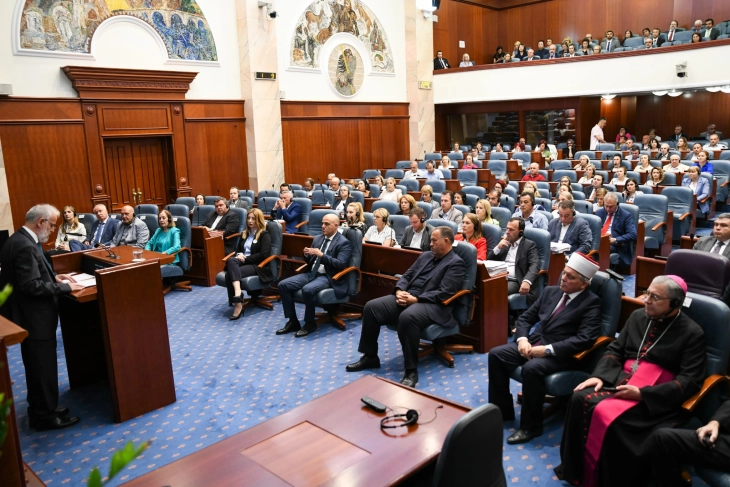Kovachevski and Xhaferi address Parliament session marking 60 years since Skopje earthquake
- Parliament Speaker Talat Xhaferi and Prime Minister Dimitar Kovachevski addressed a Parliament session on Wednesday marking 60 years since the Skopje earthquake.
- Post By Ivan Kolekevski
- 16:02, 26 July, 2023

Skopje, 26 July 2023 (MIA) - Parliament Speaker Talat Xhaferi and Prime Minister Dimitar Kovachevski addressed a Parliament session on Wednesday marking 60 years since the Skopje earthquake.
Commemorating this day is very important, because as Speaker Xhaferi said, it should serve as a reminder of the importance of unity and solidarity in helping the powerless. Kovachevski, on the other hand, said that the aid Skopje received is a reminder of the importance of solidarity during the most difficult days.
The Parliament Speaker pointed out that after the earthquake it no longer mattered who belonged to which nation, political ideology or which God they prayed to. Nor whether the support would be in the interest of the specific country or not.
"The news echoed and spread very quickly and Skopje received all the attention from the humanitarian and democratic world, who without hesitation took all necessary measures at their disposal and answered as quickly and effectively as possible to the painful cry of the affected Skopje. The International Red Cross appealed to all national organizations for help. The Inter-Parliamentary Union asked all parliaments and governments to help rebuild the city, and the United Nations, immediately after the disaster, took actions and plans for long-term support for the devastated city. In summary, international solidarity came first, and above all, humanity and human consciousness and conscience," Xhaferi stressed.
He added the day was important because Skopje united people, institutions, international organizations and humanity as a whole, which ultimately put Skopje as a city on a pedestal- a symbol of solidarity.
PM Kovachevski said that the help Skopje received is a reminder of the importance of solidarity during difficult times.
"The call for help was heard everywhere, and help started to arrive from all over the world. People from across the world lent a hand and together with our citizens rebuilt Skopje. During those moments, the sympathy, sadness and pain that was shared with the people from Skopje and the consequences left behind by the devastating earthquake were invaluable. Many days have passed, which on paper would be just a number, but in the real world they meant genuine human solidarity and help when it was most needed," Kovachevski emphasized.
He noted every building and street in Skopje is a monument of solidarity, which serves as a motive for North Macedonia to offer help and support to others who need it.
"Over 80 countries have left so much behind and Taftalidze, Madzari, Kozle, Gjorche Petrov and Centar will forever remember the long list of buildings, schools, hospitals, apartments, kindergartens as gifts from across the world. The Contemporary Art Museum holds all the works great artists sent as gifts to the destroyed city. The primary school in Taftalidze, the hospital in Kozle, and the recognizable Universal Hall which was a gift from 37 countries in the world, will forever be a reminder of what solidarity means during the most difficult moments," Kovachevski stated.

The earthquake occurred on 26 July 1963 at 5:17 am local time in Skopje, with smaller aftershocks being felt until 5:43 am, killing over 1,070 people and leaving 3,000 injured. More than 15,800 homes and apartments were destroyed, and 28,000 others were damaged. The disaster left 200,000 people homeless.
After the tragedy, the International Red Cross coordinated all national organizations to provide means for all children in Skopje. The Inter-Parliamentary Union appealed to all parliaments and governments to help rebuild the city. Humanitarian organizations in many countries began gathering aid for Skopje. The United Nations took actions and plans for long-term support for the devastated city. ssh/ik/
Photo: Screenshot







